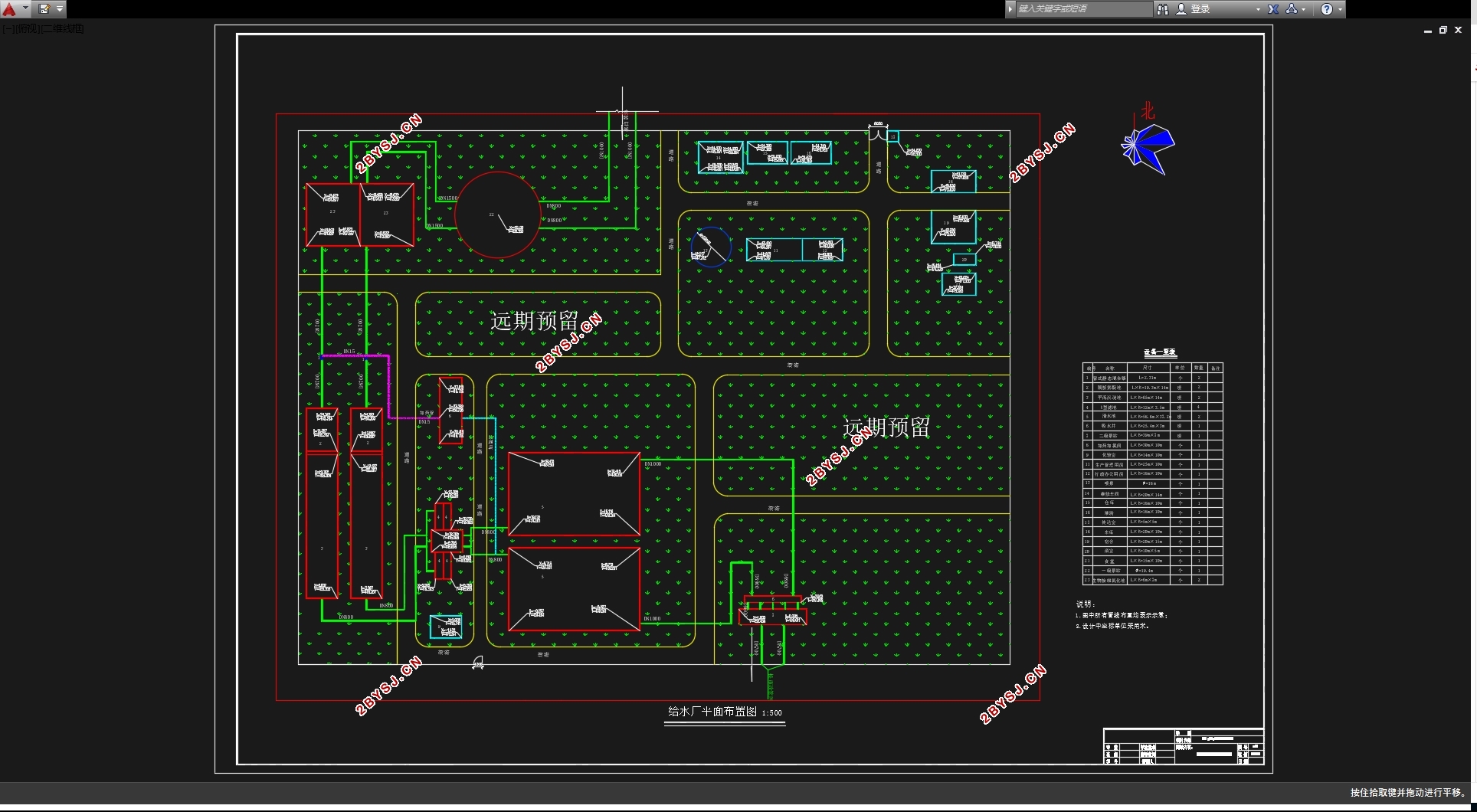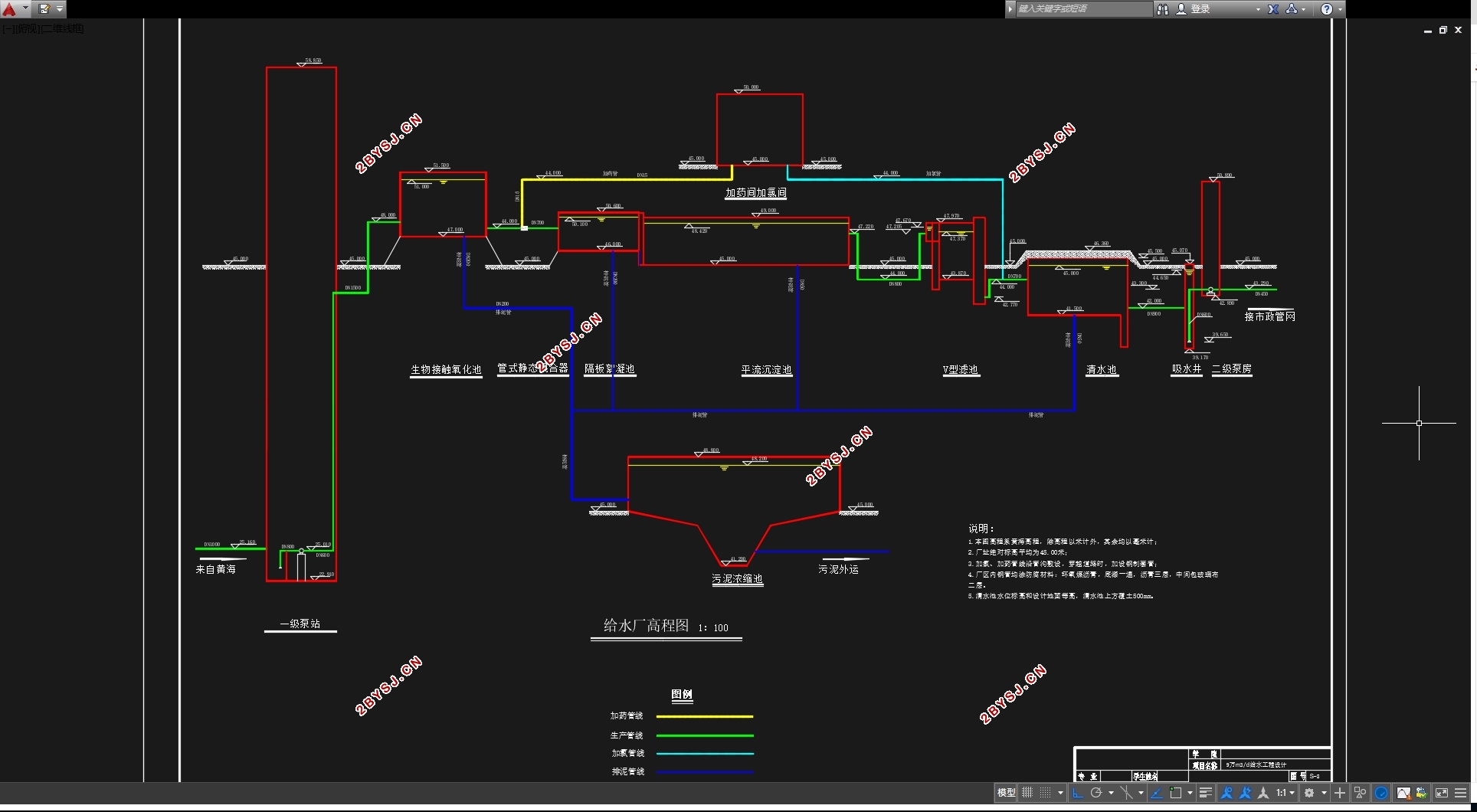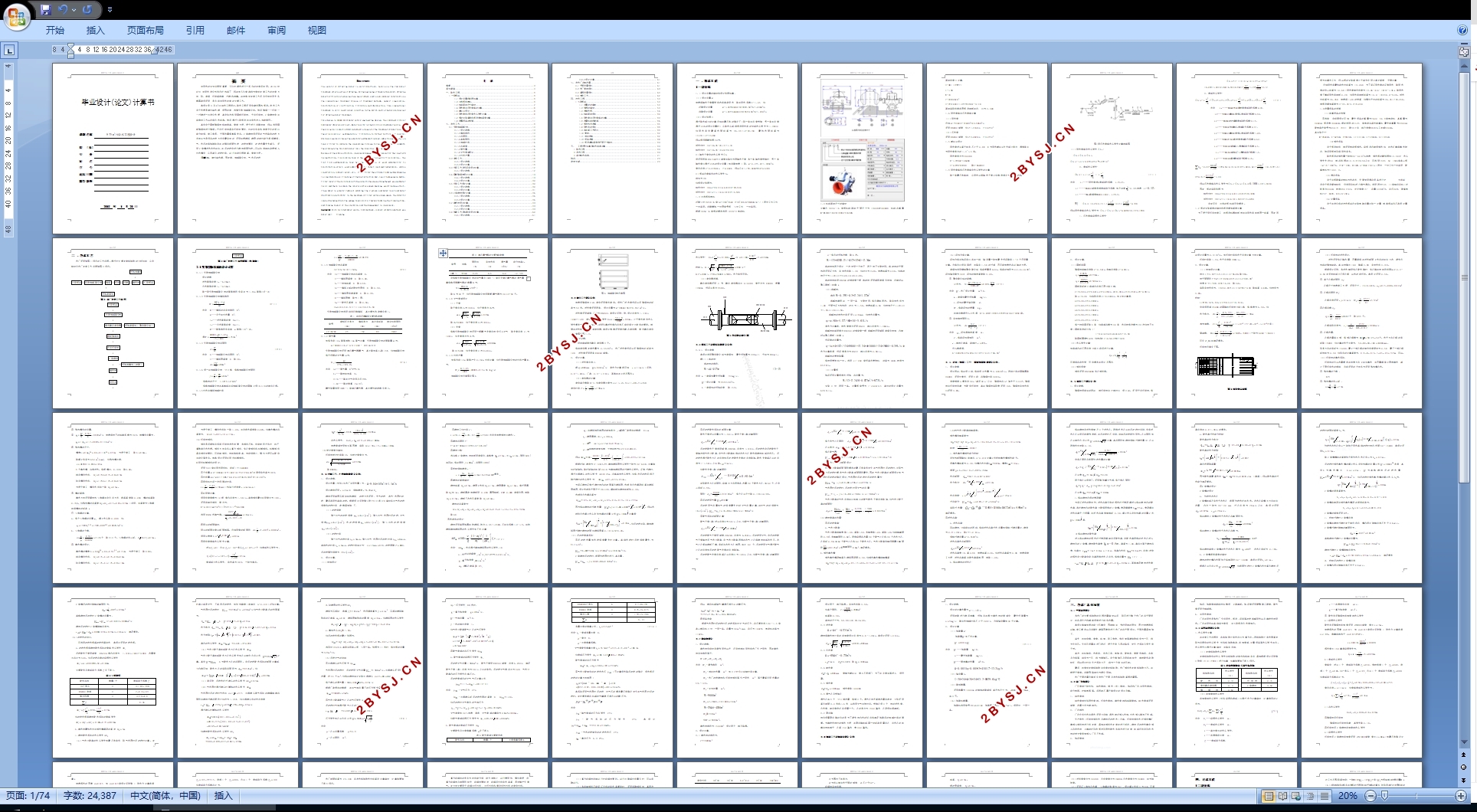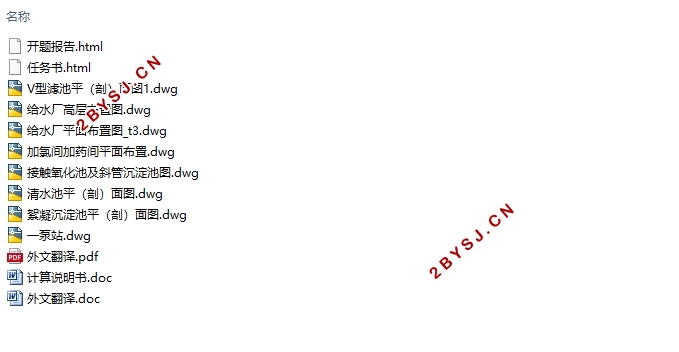9万m3/d给水工程设计(含CAD图)
无需注册登录,支付后按照提示操作即可获取该资料.
9万m3/d给水工程设计(含CAD图)(任务书,开题报告,外文翻译,计算说明书23000字,CAD图8张)
摘 要
饮用水的安全问题很重要,人们对源水进行一系列的处理后饮用。在20世纪初,饮用水净化技术已经形成了,现在被人们普遍称为常规处理工艺的处理方法,即:混凝,沉淀或澄清,过滤和消毒。这种常规处理工艺至今仍被世界大多数国家所采用,是目前饮用水处理的主要工艺。
本设计是9万m3/d给水工程设计。取水工程采用合建式圆形泵房。净水工艺由于水质是微污染水源,设预处理,选择生物接触氧化法。然后絮凝——沉淀——过滤进一步净化水质,其中依次选用隔板沉淀池、平流沉淀池、V型滤池来完成常规工艺以达到出水标准。然后通过二级泵房将自来水送入市政管网。
其中由于隔板絮凝池构造简单、管理方便、便于进行远期改造,所以选用隔板絮凝池进行絮凝。平流沉淀池具有沉淀效果好、对冲击负荷和温度变化的适应能力较强、施工简易、平面布置紧凑等优点。V型滤池所采用的气水联合冲洗方式被认为是所有冲洗方式中最有效的,采用均质滤料,滤层的纳污能力得到增强;气、水反冲再加始终存在的横向表面扫洗,冲洗效果好,冲洗水量大大减少;采用V型槽进水布水均匀;在反冲洗中进行滤池表面扫洗。可以快速地将杂质排入污水槽中,从而减少冲洗时间;运行自动化程度高、管理方便。
关键字:微污染水源、预处理、接触氧化法、气水反冲洗
Abstract
The safety of drinking water is very important, people on the raw water treatment after a series of drinking. At the beginning of twentieth Century, drinking water purification technology has been formed, and is now commonly referred to as the conventional treatment process of treatment methods, namely: coagulation, precipitation or clarification, filtration and disinfection. This conventional treatment is still used in most countries in the world, and is the main technology for drinking water treatment.
This design is 90000 m3/d water supply engineering design. The combined circular pump water diversion project. Water quality is the micro polluted water source, and the biological contact oxidation method is chosen for the treatment of water quality.. Then flocculation - sedimentation - filtration to further purify water quality, which successively choose the separator sedimentation tank, advection sedimentation tank, V filter to complete the conventional process to reach the effluent standard. Then through the two pump water into the municipal pipe network.
Because of the simple structure, convenient management, convenient for the long-term reconstruction, flocculation tank of the separator is used for flocculation.. The flat flow sedimentation tank has the advantages of good adaptability to precipitation effect, good adaptability to impact load and temperature, simple construction, compact layout, etc.. V-type filter the air water combined backwashing is considered as all flushing of the most effective way, use of homogeneous media, filter layer of the pollutant carrying capacity has been strengthened; gas and water recoil and there is always the lateral surface sweep washing, good flushing effect, rinse water is greatly reduced; adopting the V groove and water inlet and water distribution uniformity; in the backwash of filter surface wash sweep. The impurity can be discharged into the sewage tank quickly, thereby reducing the flushing time, and running highly of the operation and the management is convenient.
Keywords: micro polluted water source, pretreatment, contact oxidation method, gas water anti – flushing
1一级泵站
1.1设计流量的确定和设计扬程估算:
(1)设计流量Q
考虑到输水干管漏损和水场本身用水,取自用水系数α=1.05,则
近期设计流量 Q=1.05*90000/24=2922.5m3/h=1.094m3/s
远期设计流量 Q=1.05*1440000/24=6562.5m3/h=1.75m3/s
(2)设计扬程H
通过取水部分的计算已知在最不利的情况下(即一条自流管检修,另一条自流管通过70%的设计流量时),从取水头部到泵房吸水间的全部水头损失为1.2mH20
则吸水间中最高水面标高为24.35-1.2=23.15m,最低水面标高为13.24-1.2=12.04m
所以泵所需静扬程HST为:
洪水位时,HST=34.25-23.15=11.1m
枯水位时,HST=34.25-12.04=22.21m
2)输水干管中的水头损失∑h
设采用两条DN1500*12钢管并联作为原输水干管,当一条输水管检修时,另一条输水管应通过70%的设计流量(按远期考虑),即:Q=0.7*1.75=1.225m3/s
管内流速v=0.7755m/s,i=0.0004,所以∑h=1.1*0.0004*950=0.418m
3)泵站内管路中的水头损失hp
粗估为2m
则泵设计扬程为:
枯水位时,Hmax=22.21+0.418+2+2=26.63m
洪水位时,Hmin=11.1+0.418+2+2=15.52m




目 录
摘要 2
英文翻译 3
一、取水工程 6
1一级泵站 6
1.1设计流量和扬程估算 6
1.2初选泵和电机 6
1.3机组基础尺寸确定 7
1.4吸水管与压水管路的计算 8
1.5喇叭口设计 8
1.6吸水管和压水管水头损失计算 8
1.7泵的安装高度和泵房简体高度计算 11
1.8附属设备的选择 11
二、净水工艺 6
2.1生物接触氧化池 13
2.1.1设计参数 12
2.1.2填料容积 13
2.1.3总面积 13
2.1.4单格面积 13
2.1.5接触时间 14
2.1.6总高度 14
2.1.7需气量 14
2.1.8空气管道设计 15
2.1.9污泥产量 15
2.2混合工艺 16
2.2.1设计参数 16
2.2.2设计计算 16
2.3投药工艺及投药间设计计算 17
2.3.1设计参数 17
2.4隔板絮凝池设计计算 19
2.4.1设计参数 19
2.4.2设计计算 20
2.5沉淀工艺设计计算 20
2.5.1设计参数 20
2.5.2设计计算 21
2.6 V型滤池设计计算 24
2.6.1设计参数 24
2.6.2设计计算 24
2.7清水池设计计算 39
2.7.1设计参数 39
2.7.2设计计算 39
2.8加氯工艺及加氯间设计计算 40
2.8.1设计参数 41
2.8.2设计计算 41
三、净水厂总体布置 41
3.1平面布置设计 41
3.2水厂管线设计 42
3.3高程布置设计 43
3.4排泥工艺 47
四、送水工程 53
1二级泵站 53
1.1流量的的确定 53
1.2扬程的确定 53
1.3选择水泵 54
1.4机组基础设计 60
1.5吸水管与压水管路的计算 62
1.6布置机组和管道 64
1.7泵房形式选择 65
1.8吸水井的设计 66
1.9各标高工艺设计 66
1.10复核 67
1.11消防校核 67
1.12设备选择 68
1.13泵房建筑高度和平面尺寸确定 69
五、 工程投资估算及制水成本计算 69
1取水工程 69
2净水工程 69
3单位制水成本 71
结语 72
参考文献 73
